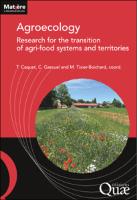Agroecology
research for the transition of agri-food systems and territories
Contributor(s)
Caquet, Thierry (editor)
Gascuel, Chantal (editor)
Tixier-Boichard, Michèle (editor)
Language
EnglishAbstract
Agroecology was chosen by INRAE as one of its interdisciplinary scientific foresight studies designed to identify research fronts in response to major societal challenges. Eighty researchers drew up an assessment and proposed research avenues for agroecology. This book summarizes their main conclusions. Agroecology, as a scientific discipline that puts ecology back at the centre of agricultural system design, is now well established. Diversification of living organisms in agroecosystems is a broad objective that is intended to make these systems more robust and resilient. Research in genetics and landscape ecology must be mobilized so that agroecology can use mechanisms from the field to landscape scales. Progress is being made in modelling agroecological systems to better understand the many biotic and abiotic interactions, to predict them, and to begin to manage some of them. Diversification of living organisms in agricultural production (species, varieties, crop rotations, etc.) leads to more varied products. The consequences will be significant on the commodity chains, and more precisely on agri-food systems, from production methods to product consumption. These changes are long-term. The agroecological transition, which is adaptive, co-constructed with all actors, is in itself a research subject, and will rely on experimental devices, farms, and ‘Territories of innovation’.
Keywords
agriculture,agronomy,food, ecology, animal husbandry, farming, genetics, landscapeDOI
10.35690/978-2-7592-3294-9ISBN
9782759232932, 9782759232956Publisher
éditions QuaePublication date and place
2020Classification
Agronomy and crop production


 Download
Download